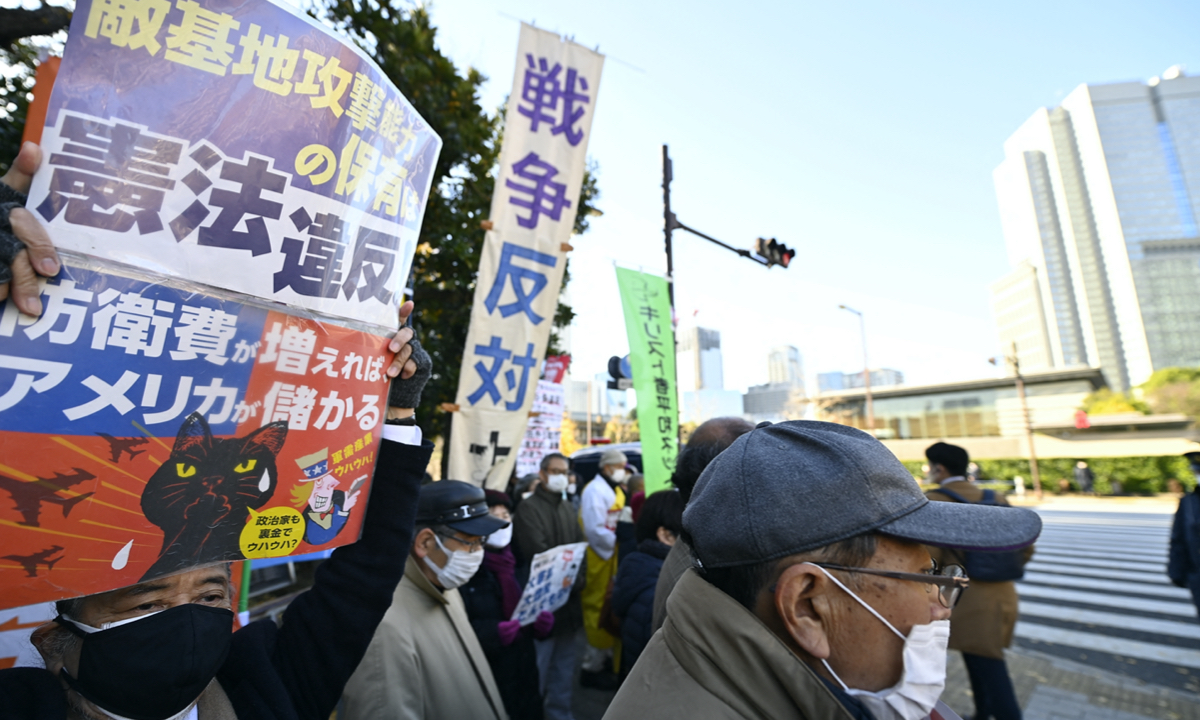
People gather outside Japanese Prime Minister Fumio Kishida's office holding placards denouncing the violation of Article 9 of the Japanese Constitution in Tokyo on December 16, 2022. They also oppose the increase in the military spending budget. Japan approved its biggest military buildup since World War II on December 16. Photo: AFP
Japan's relentless pursuit of breakthroughs in military development has sparked strong concerns from its neighboring countries and the international community, a Chinese Foreign Ministry spokesperson said on Tuesday, after Japan's cabinet greenlighted the export of new fighter jets it is developing with the UK and Italy.
The evident departure from Japan's postwar pacifist principles will pose a serious threat to the security situation not only in East Asia but also the whole world, experts warned.
The latest move will allow Japan to export, for the first time, lethal weapons it co-manufactures to other countries. According to AP, the contentious decision is "part of a move to build up the Japanese arms industry and bolster its role in global security."
The change comes as Japanese Prime Minister Fumio Kishida is planning a state visit to the US in April, where he is anticipated to stress Japan's readiness to take on a greater role in military and defense industry partnerships, the AP report said.
The new resolution opens the door for the direct export of advanced military equipment such as Japanese warships and submarines to third countries in the future, experts noted.
Lü Yaodong, deputy director of the Institute of Japanese Studies, Chinese Academy of Social Sciences, told the Global Times on Tuesday that Tokyo's decision has broken through the restraints of Japan's prohibition on exporting lethal weapons that has lasted for more than 70 years after World War II.
"Now, Japan is taking small steps, like salami slicing, to gradually break free from its own constraints, with the fundamental goal of shattering the postwar international arrangements and ultimately amending Article 9 of the Japanese Constitution to allow the Self-Defense Forces to engage in warfare," Lü noted.
Chinese Foreign Ministry spokesperson Lin Jian expressed grave concern over the decision at Tuesday's routine press briefing, noting that given Japan's not-too-distant history of militarist aggression, Japan's military and security moves are closely watched by its Asian neighbors and the international community.
In recent years, Japan has been drastically readjusting its security policy, increasing defense spending year after year, relaxing restrictions on arms export and seeking military breakthroughs. These moves trigger serious concerns among Japan's neighboring countries and the international community.
Lin urged Japan to earnestly respect the security concerns of neighboring countries, deeply reflect on its history of aggression, commit itself to the path of peaceful development and earn the trust of its Asian neighbors and the international community through concrete actions.
The Japanese government claimed that it is limiting exports of lethal weapons to the jet for now, which will not be sold to those engaging in active wars. Potential buyers will be limited to the 15 countries that Japan has signed defense partnership and equipment transfer deals with, according to media reports.
"Although Japan has 'promised' not to sell fighter jets to countries at war, how can it be sure that it will not flow to those countries? A fighter jet with offensive capabilities, no matter how restricted, is always prepared for war and conflict," Lü said.




